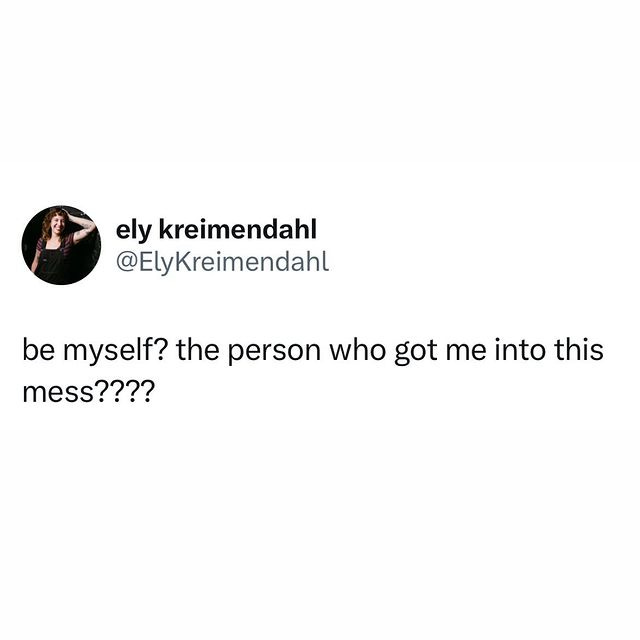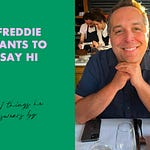Hi! How’s your week going? We’re excited to chat with you! First up, an eight-minute podcast in which I ask my psychologist friend Lina Perl our therapy etiquette questions, including whether therapists have favorite clients (and is it us?!) and how to break up with a therapist. Here’s the transcript, too.
This issue is jam-packed with good stuff, like a funny Q&A with comedian-therapist Ely Kreimendahl, and advice about accessing care with Dr. Pooja Lakshmin. We’re also donating a percentage of today’s profits to Loveland Therapy Fund, which provides financial assistance to Black women and girls seeking therapy. If you’re able, we’d love you to join us in giving here.
Finally, readers share the best advice they’ve gotten from their therapists, and, you guys, the answers are so good!!! Please add your therapy takeaways in the comments, if you’d like…
We initially followed comedian Ely Kreimendahl for her funny Instagram reels. But then we realized she’s also a therapist and podcast host and writer and mom — which made her the perfect person for Big Salad editor Kaitlyn Teer to turn to with all our weirdest therapy questions. Here goes…
Do your friends and relatives treat you differently because you’re a therapist?
Not at all. At first, if I called out my parents on something, they’d joke, like, “Oh, it’s psychological o’clock.” But they’re Baby Boomers and have never been to therapy.
What about people at cocktail parties?
In New York City? No. People don’t bat an eye when they find out I’m a therapist and a comedian. I’m like a multi-hyphenate. I’ll heal you and make you laugh!
Because you’re a therapist, do you feel pressure to be really good at your own mental health and relationships?
No! The therapists I respect most are those who are honest about being just as messy of a human being as anyone else. The therapists that terrify me are the ones who are like, I’m healed. If you’re unwilling to acknowledge your broken pieces, which you’re going to be working with the rest of your life, how can you show up in your sessions with your clients?
What are some popular misconceptions about therapy?
The most common one may be that people believe you need to go to therapy only if you’re in a crisis. It’s true that some forms of therapy are solution-focused, where you’re just going in and getting out and it’s more surgical. But many therapists don’t practice in that way. Instead, it’s about what can be rewired by building a long-term therapeutic relationship in which you feel safe to explore things. The actual relationship is part of what’s curative.
What do you think about mental health content on social media? There’s so much, which seems great because maybe there’s less stigma. But it can also feel overwhelming to sift through all the advice.
I was super depressed in college, which was in the early aughts, so pre-social media — but I didn’t even consider that I was experiencing depression, or even said the word. So, I think the increased awareness is wonderful.
At the same time, people should be careful about what they take in. With anything, there are people who are doing amazing stuff with their social media accounts, and there are people who are doing bad stuff, at best, and harmful stuff, at worst. Even if a person has credentials, it doesn't mean that what they're saying is correct. There are a lot of shitty therapists, and just because someone makes an Instagram reel about toxic relationships doesn’t mean they're an expert on toxic relationships.
It’s fascinating because it seems like certain concepts become trendy — like, all of a sudden, everyone is talking about boundaries.
Yes, and a few years ago, everyone was talking about narcissists! There’s this whole trope about how, when you’re training to be a therapist, you go through a phase where you start diagnosing yourself and everyone in your life. I remember my abnormal psychology professor telling us at the start of the term, There is no way that every single one of you has borderline personality disorder and narcissism and antisocial traits and you're not all bipolar, I promise. And we laughed, but then that sort of happened. Maybe it’s like that with mental health content on social media. It’s useful information, but we don’t need to be constantly pathologizing ourselves and others.
Do you have favorite depictions of on-screen therapists?
When I’m watching a therapist in a film or TV show, it’s hard for me to tell if the writers intended that character to be good or not, unless they are so clearly bad. Sometimes I’m watching and I’m like, Put me in the writers’ room, coach!
But in Mr. and Mrs. Smith, Sarah Paulson’s character is just…chef’s kiss. They wrote the character really well. She was kind of a bad therapist, but also good in a way, but also horrible. She was such a hate-able person, I loved it.
I will say, what I found relatable was the moment you see her post-session. She immediately vaped and lay down. You’re super “on” during therapy, you sometimes need a break after. I used to work in a community mental health clinic, and a fellow therapist and I would joke about how when our clients would leave, we would lie down on the floor and scroll Buzzfeed listicles.
What inspired you to make a podcast about shame? It feels so big and sticky.
Shame has been a defining feature in my life, ever since I was a kid. A lot of that has to do with growing up queer and closeted and knowing it was going to be a big issue when I came out. And I also had undiagnosed OCD and ADHD, so I used to think, all these things are wrong with me…I guess it’s because I’m a bad person.
My podcast Shame Spiral is a mental health / comedy hybrid, where I talk to people, especially other comics and writers, about their relationships with shame. What’s so cool is that talking about shame — connecting over it, laughing about it and receiving it with warmth — feels really good and takes away some of its power. I’ve reshaped my relationship with shame by making art. My hope is that the podcast also does that for listeners.
It’s hard to be human! I feel so tenderly toward us, like we’re all just tragically lovable.
Humans are given an impossible task. We’re all just trying to be okay with the fact that we could die at any moment. And that everyone we love will die. That, at any point, everything we hold dear could be taken from us, and we can't really know anything for certain.
I think it’s an absurd ask to be like, Can you just hold all of that existential terror and be happy and have a meaningful life and pay your bills? Oh, and don't forget to drink water! So, I try to find the playfulness in that. We just need to give ourselves a break.
There are so many things that are adorable and tender about the ways we try to survive those ambiguities. And there are just as many ways of surviving that are heartbreaking. I’m always trying to be okay with the complexity of it all, and it’s a lifelong struggle.
Thank you so much, Ely! We’re so grateful!
What’s the most useful thing your therapist has ever told you? For Abbey Nova, it was the anxiety-easing question, “What if it’s easy?” And Joanna’s therapist often reminded her, “Both things can be true.”
Here, seven readers share their answers...





















